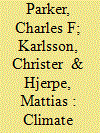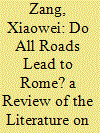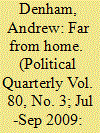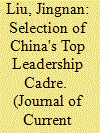| Srl | Item |
| 1 |
ID:
142562


|
|
|
|
|
| Summary/Abstract |
Past research has posited that effective leadership is an essential ingredient in reaching international agreements and overcoming the collective action problems associated with responding to climate change. Despite its fundamental importance for leadership relationships, the demand side of the leadership equation has been comparatively neglected in the literature. In this study, we answer several related questions that are vital for understanding the leadership dynamics that impact the United Nations Framework Convention on Climate Change (UNFCCC) negotiations. Are there any leaders in the field of climate change and, if so, who are they? How do followers select climate leaders? What factors are important to them? Using unique survey data collected at four consecutive United Nations (UN) climate summits, Conference of Parties (COP) 14–17, this article investigates which actors are actually recognized as playing a leadership role in the UNFCCC negotiations and probes how followers select leadership candidates in this issue area. The survey findings reveal a fragmented leadership landscape, with no one clear-cut leader, and spotlight that if an actor seeks to be recognized as a leader, it is crucial to be perceived as being devoted to promoting the common good.
|
|
|
|
|
|
|
|
|
|
|
|
|
|
|
|
| 2 |
ID:
193140


|
|
|
|
|
| Summary/Abstract |
Political elites have a tremendous influence on past, present and future socioeconomic and political developments in both western and non-western countries. Unsurprisingly, the analysis of China’s elites has been crucial in the study of politics there. A large body of literature has examined the members of the Central Committee of the Chinese Communist Party, a stronghold of the nation’s political elites. Given the growing interest and research on elite politics in the PRC in recent years, this paper reviews studies of the pathways to political power and the personal qualifications of the members of the Central Committee that are central to studies of elite Chinese politics. This review paper is organized both chronologically and thematically. It shows a shift away from the study of demographics of Central Committee members toward theorizing of how recruitment into the Central Committee works. Some scholars have theorized succession politics in China as the rise of technocracy, while others have used institutionalization and factional politics to explain how China’s leaders are selected. This paper summarizes and identifies several theoretical and methodological issues in existing studies as an effort to advance research on succession politics and political evolution in China.
|
|
|
|
|
|
|
|
|
|
|
|
|
|
|
|
| 3 |
ID:
092406


|
|
|
|
|
| Publication |
2009.
|
| Summary/Abstract |
The Conservative Party is the oldest of the 'mainstream' British parties, but has only elected its leader since 1965. In this article, I explain the variety of methods used by the Party to select its leader and assess the impact of 'democratisation' over time. I begin by examining the informal 'system', known as the 'magic circle', which existed until 1965, and explain how and why it came to be abandoned. I then discuss the six elections between 1965 and 1997, when the Tory leader was chosen exclusively by the Party's MPs. Finally, I assess the impact of the 'Hague rules', according to which Party members have the final say, between their adoption in 1998 and the election of David Cameron in 2005.
|
|
|
|
|
|
|
|
|
|
|
|
|
|
|
|
| 4 |
ID:
187413


|
|
|
|
|
| Summary/Abstract |
This article provides empirical evidence to show how the general secretaries of the Chinese Communist Party dominated provincial personnel through their factional ties. Based on panel data from 1993 to 2017, this study finds that the provincial leaders’ personal connections with the incumbent party head significantly increased their promotion chances. The positive effect of the incumbent party heads on promotion did not depend on provincial leaders’ economic performance and seniority. This study further uncovers that working experiences in the prefectural leading positions strongly increased the likelihood of promotion. However, connections with other important top leaders did not have similar effects. These findings challenge the traditional wisdom on the collective leadership and indicate the dominance of the Chinese Communist Party's heads for provincial personnel arrangements.
|
|
|
|
|
|
|
|
|
|
|
|
|
|
|
|